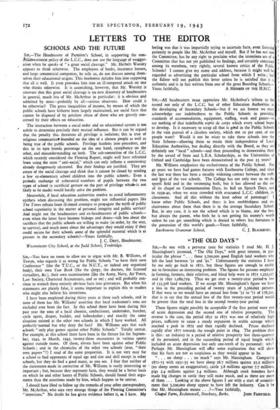Sta,—You have no room to allow me to argue with
Mr. R. Williams, of Towyn, who regards it as wrong for Public SChools " to have their own Conference " (like the T.U.C., or the N.U.T., or indeed any organised body), their own Year Book (like the clergy, the doctors, the licensed victuallers, &c.), their own examinations (like the Army, Navy, Air-Force, Law Society, Chartered Accountants, and so on) ; and will probably con- tinue to wrench these entirely obvious facts into grievances. But when his statements are plainly false, it seems important to explain this to readers who might else believe his inventions.
I have been employed during thirty years at three such schools, and in none of them has Mr. Williams' assertion that local tradesmen's sons are excluded ever been the fact. In this school there have been during this past year the sons of a local chemist, confectioner, undertaker, butcher, cycle agent, draper, builder, and haberdasher ; and exactly the same situation existed at the other two schools in which I have worked. All perfectly-normal but why deny the fact? Mr. Williams says that such schools " only play games against other Public Schools." Totally untrue. For example, at this school there have been in the fixture list for Septem- ber, 1942, to March, 1943, twenty-three encounters in various sports against outside teams. Of these, eleven have been against other Public Schools ; and in the chronicles of the other two schools (true, " their own papers "l) I read of the same proportion. It is not very easy for a school to find opponents of equal age and size and skill except in other schools, but they do find a good many, as you see. I fear that neither of the statements made in correction of Mr. Williams is vastly interesting or important ; but, because they represent facts, they would be a better basis on which he and other haters of Public Schools, should found their argu- ments than the assertions made by him, which happen to be untrue.
I should have liked to follow up the remarks of your other correspondent, Mr. McArthur, who says very strange things of the Fleming Committee's " intentions." No doubt he has given evidence before it, as I have. My
feeling was that it was impartially trying to ascertain facts, even listening patiently to people like Mr. McArthur and myself. But if he has not met the Committee, has he any right to proclaim what the intentions are of a Committee that has not yet published its findings, and certainly contained among its members, very rightly, several known critics of the Public Schools? I cannot give my name and address, because it might well be regarded as advertising the particular school from which I write ; but the Editor will not publish this letter unless he is satisfied that it is authentic and is in fact written from one of the great Boarding Schools.—


























 Previous page
Previous page